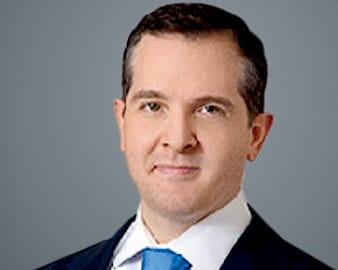
Three alumni share how creative approaches helped them navigate challenges in commercial real estate and real estate investment.
- By
- January 10, 2016
- Real Estate


The Challenge: In late 2010, Seth Hewitt was a senior vice president of asset management with Chicago-based ST Residential, which managed (and whose investors owned) a $4.5 billion commercial real estate loan and asset portfolio, including the defaulted loan on a high-rise condominium property in Chicago’s South Loop. The property was saddled with cost overruns, unpaid bills, ongoing contractor litigation, and significant water damage in the building from a burst pipe. Upon taking ownership, ST considered selling the building as is for approximately $40 million, which would have been profitable and reduced risk.
The Strategy: Research suggested developing the property would be a better plan. A tighter mortgage-lending environment swayed Hewitt to change the property to apartment rentals. “We also knew that because the market was so distressed, there would be a lack of new rental product coming online, so we would face less competition,” he said.
“The distressed environment meant there were capable developers and other outside experts with more availability.”
— Seth Hewitt
“The distressed environment meant there were capable developers and other outside experts with more availability,” so he sought out such groups for their real estate skills and experience to execute on his plans. Hewitt and his team—which included outside consultants—redesigned the building with amenities such as a resident club room, gym, pool, and dog run to attract the growing numbers of young professionals whom research showed were moving into Chicago. To repair the damage and offset much of the redevelopment costs, Hewitt and his team negotiated a favorable insurance settlement. Opened in 2012, the reinvented 329-unit apartment building leased up well ahead of schedule. After successfully fulfilling its strategy, ST sold the building in late 2013 for $96 million.
The Takeaway: Careful analysis, planning, and patience in distressed environments can offer opportunities to work with subject-matter experts normally not available during boom times, allowing businesses to leverage partners with greater resources and experience.

The Challenge: In late 2012, Brian Finerty was looking at adding the Bogotá, Colombia-based Decameron All-Inclusive Hotels and Resorts to the investment portfolio for Equity International, a $2 billion investor and builder of real estate companies outside of the United States. However, the Colombian real estate market at the time was in the early stages of institutionalization. Unlike in the United States, there wasn’t a long-running public record of real estate transactions, making market data limited and valuations difficult.
Moreover, while Decameron Hotels and Resorts had strong front-office operations, the back-office reporting for the 25-year-old firm was a challenge. “The dual challenge was the lack of market information and a lack of information on the company. There are also cultural sensitivities you have to address when working in emerging markets,” Finerty said. “You can’t just walk in with a list of demands; you have to understand historical context and where people are coming from.”
The Strategy: Observing positive trends in middle-class Latin Americans’ vacation-spending habits encouraged Finerty’s team to explore options to buy the hotel chain. They expanded their partnership with the well-known Santo Domingo family in Colombia, owners of several other consumer-related businesses, and a partner in another Equity International portfolio company, Terranum Corporate Properties.
“You can’t just walk in with a list of demands; you have to understand historical context and where people are coming from.”
— Brian Finerty
“The partnership allowed us access to information and relationships—to understand the market and company-specific dynamics,” he said. The Santo Domingo family also had a long-standing relationship with the hotel chain’s existing CEO. Those relationships and that access helped Finerty recreate the numbers for the business historically, allowing him to build future projections in order to do proper due diligence. Equity International closed on the investment in May 2014, and the hotel platform remains in the portfolio. The hotel’s financials are now reconciled, which has brought “more visibility and more information to enhance the decision-making process in longer-term strategic planning,” he said.
The Takeaway: Don’t be scared off by an initial lack of information on an investment if the conviction in a point of view on a trend is there. The deal may be worth your while, especially if the right resources and right partners are present.

The Challenge: In 2008, Gavin Campbell, founder and managing principal at Steelbridge Capital, a privately held real estate investment company with $1 billion in assets under management, wanted to expand its acquisition and real estate services business into Florida. Being based in Chicago, Campbell knew he needed someone who lived in Florida and had extensive knowledge of the market.
The Strategy: Steelbridge specializes in off-market deals, rather than buying real estate via auctions. At first Campbell talked to acquisition professionals, but many of them had no history of sourcing off-market deals. “We came to realize what we needed in order to get these off-market acquisitions was to find someone who knew the owners,” he said. That led him to seek real estate brokers, and he eventually hired a broker who had previously sold assets for him when he worked at Jones Lang LaSalle’s subsidiary, LaSalle Investment Management. Campbell said he had an initial bias against hiring a real estate broker because a broker’s typical training is not in dissection and analysis, but rather in marketing and promotion. In his experience working with him before, however, Campbell knew the broker thought like an acquisition agent. “I recognized he had all the skills necessary to do acquisition, plus he had all the owner relationships I needed. He was the guy who made sense,” Campbell said.
“What we needed in order to to get these off-market acquisitions was to find someone who knew the owners. ”
— Gavin Campbell
Campbell hired the broker, and within two months of joining the new hire identified two off-market acquisitions that turned out to be some of Steelbridge’s best recent deals. Additionally, capitalizing on the broker’s 30 years of investment sales history, agency business, and extensive contacts, Steelbridge created a boutique real estate services business, a brand new enterprise for the firm.
The Takeaway: When analyzing personnel needs, break it down by the kind of functions the firm needs and consider whether the specific functions can be found in a traditional hire or if they are available elsewhere.
We'd love to hear your Booth memories, stories, connections...everything.